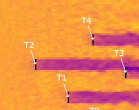Grid Status Data Download#
This page describes how to download LMP (Locational Marginal Pricing) data from Grid Status for use in Hercules simulations.
Basic Workflow#
Refer to examples/grid/grid_status_download_example.py for an example of how to download LMP data from Grid Status. The script saves data in a lightly modified feather format that can be used directly in Hercules.
If you need to combine real-time and day-ahead data for Hycon, see the section on generate_locational_marginal_price_dataframe_from_gridstatus() at the end of this page.
What is Grid Status?#
Grid Status is a platform that provides electricity market data including:
Real-time and historical LMP data
Market operations data
Grid status information
Power system reliability data
API Key Setup#
To use this script, you’ll need an API key from Grid Status:
Visit Grid Status API Settings
Sign up for an account if you don’t have one
Generate an API key
Set the API key as an environment variable or configure it in your Grid Status client, this could done either by a shell command
export GRIDSTATUS_API_KEY=your_api_keyor by addingexport GRIDSTATUS_API_KEY="your_api_key"to your.bashrcor.zshrcfile
Downloading LMP Data with grid_status_download.py#
The grid_status_download.py example script downloads LMP data from Grid Status and saves it in a lightly modified feather format. The modifications are minimal:
Removes columns not used by Hercules (
interval_end_utc,location,location_type,pnode)Keeps the original time resolution and market type
Saves as a feather file for efficient storage
The downloaded feather files can be used directly in Hercules for applications that need only real-time or only day-ahead data.
Why uvx?#
We recommend running the script with uvx to run in an isolated environment because the gridstatusio package requires a different version of numpy than the rest of Hercules. Using uvx prevents dependency conflicts between the Grid Status client and Hercules’ requirements.
See https://docs.astral.sh/uv/getting-started/installation/ for information in installing uv.
Usage#
To modify the example script to download data for your own use, you can:
Copy the script to your project folder
Update the parameters in the script:
dataset: Set to"spp_lmp_real_time_5_min"for real-time data,"spp_lmp_day_ahead_hourly"for day-ahead data, or any other Grid Status datasetstartandend: Date range for the datafilter_columnandfilter_value: These are used to select the node of interest
Run the script with uvx:
uvx --with gridstatusio --with pyarrow python grid_status_download.py
If you need multiple datasets (e.g., both real-time and day-ahead), update the dataset parameter and run the script again.
See examples/grid/grid_status_download_example.py for an example that downloads both real-time and day-ahead datasets.
Parameters#
dataset: The Grid Status dataset identifier (e.g., “spp_lmp_real_time_5_min”, “spp_lmp_day_ahead_hourly”; see https://www.gridstatus.io/datasets for a complete list)
start: Start date in YYYY-MM-DD format
end: End date in YYYY-MM-DD format
filter_column: Column to filter on (usually “location” to select a node)
filter_value: Value to filter by (should be the name of a node of interest, e.g., “OKGE.FRONTIER”; all nodes listed here: https://www.gridstatus.io/nodes)
QUERY_LIMIT: Maximum number of rows to download (default: 20,000). Included to avoid accidentally using too much of account limit.
Output#
The script saves the downloaded data as a feather file (.ftr) with:
Filename format:
gs_{dataset}_{start}_{filter_value}.ftrOriginal time resolution (5-minute intervals for real-time, hourly for day-ahead)
Original market type identifier preserved in the
marketcolumn
Combining Real-Time and Day-Ahead Data for Hycon#
If you need to combine both real-time and day-ahead LMP data for use with Hycon, use the generate_locational_marginal_price_dataframe_from_gridstatus() function located in hercules/grid/grid_utilities.py.
Note: This step is only necessary if you need both real-time and day-ahead data combined. If you only need one type of data, you can use the feather files from grid_status_download.py directly.
The generate_locational_marginal_price_dataframe_from_griddstatus() function combines the real-time and day-ahead LMP data into a format optimized for Hycon:
Merges real-time and day-ahead data at the base interval of the real-time data
Creates hourly day-ahead LMP columns (
lmp_da_00throughlmp_da_23) for each hour of the dayForward-fills any missing values
Generates “end” rows for each time interval for Hercules interpolation
See examples/grid/process_grid_status_results.py for a complete example.
Output Format#
The resulting DataFrame contains:
time_utc: UTC timestamp``: Real-time LMP at the base time interval
lmp_da: Day-ahead LMP (forward-filled to the base interval)lmp_da_00throughlmp_da_23: Day-ahead LMP for each hour of the day
This format is optimized for use with Hycon in Hercules simulations.
